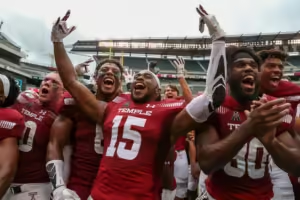
Temple University Owls now what Arkansas Razorbacks think they are
Firstly, Temple University in Philadelphia, Pennsylvania, has a rich academic and cultural history dating back to 1884. It’s known for its vibrant campus life and diverse student body, offering a wide range of programs and research opportunities. The Temple Owls, their athletic teams, embody the spirit of the university with determination and passion.
On the other hand, the Arkansas Razorbacks represent the University of Arkansas, located in Fayetteville. This institution, founded in 1871, has grown to be a cornerstone of higher education in the South, known for its strong academic programs and proud sporting tradition. The Razorbacks, with their distinctive mascot, symbolize strength and tenacity in collegiate sports, particularly football and basketball.
Comparing these two athletic programs brings up interesting parallels and contrasts. Both universities have dedicated fan bases and compete in NCAA Division I sports, yet their historical contexts and regional influences shape their identities differently.


Temple University, as a prominent urban university, mirrors the grit and determination of Philadelphia itself. The Owls’ athletic achievements, though perhaps not as nationally recognized as some powerhouse programs, reflect their resilience and competitive spirit. They have made significant strides in recent years, particularly in basketball and football, challenging larger programs with their skill and determination.
Arkansas, on the other hand, carries a legacy deeply rooted in Southern traditions and collegiate athletics. The Razorbacks are synonymous with SEC competitiveness, where football reigns supreme. Their fan base is fervent, and their successes in football and basketball, including numerous conference titles, underscore their stature in collegiate sports.
In terms of perception and self-identity, Temple University Owls have cultivated a reputation as underdogs who defy expectations. This resonates with the spirit of Philadelphia, a city known for its blue-collar work ethic and resilience. The Owls often find themselves pitted against larger, more established programs and consistently prove their mettle on the field or court.
Conversely, the Arkansas Razorbacks see themselves as contenders in a fiercely competitive SEC landscape. They embody the pride and tradition of Southern collegiate sports, where football is not just a game but a way of life. Razorback fans expect excellence and celebrate their team’s successes as a reflection of the university’s strong athletic tradition.
In terms of facilities and resources, both universities have invested significantly in their athletic programs. Temple University’s ongoing upgrades to facilities and coaching staff reflect their commitment to improving their competitive edge. While they may not have the same level of financial resources as some larger programs, their strategic investments have paid off in terms of performance and visibility.
Arkansas, benefiting from the SEC’s substantial financial backing and fervent fan base, enjoys state-of-the-art facilities and resources. This support enables the Razorbacks to recruit top-tier athletes and compete at the highest level in collegiate sports. The university’s commitment to athletics is evident in its extensive facilities and robust athletic department.
In conclusion, while Temple University Owls and Arkansas Razorbacks share a dedication to collegiate athletics and competitive spirit, their identities and perceptions in the sports world are shaped by different histories, regions, and resources. The Owls represent resilience and determination in an urban setting, embodying the spirit of Philadelphia. In contrast, the Razorbacks are steeped in Southern tradition and SEC competitiveness, boasting a strong fan base and extensive athletic resources. Both universities have carved out unique identities in collegiate sports, reflecting their respective histories, values, and commitments to athletic excellence.
Leave a Reply